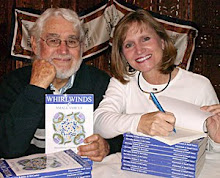In our recent book, WHIRLWINDS AND SMALL VOICES, my daughter, Amy and I write a lot about how language is developed and used.. As far back as 500 BCE the Greeks advocated the development of an international, or alternative, language that everybody in the world could learn. The Greeks thought such a common language would prevent wars, assist in international business dealings, promote academic and cultural ties and stall off domestic violence. With such a language children and parents could actually understand one another! The fact is, we have such a language, in fact, more than one. The most important one is Esperanto. 100,000 people can speak and understand Esperanto. Esperanto is spoken in at least 83 countries. There is an annual World Esperanto Conference. More than 100 periodicals are published in Esperanto and more than 30,000 books.
I have a basic Esperanto grammar book. It hasn't gone well. I haven't found anybody else who can speak or understand it. I've had to revert to my basic English with attempts at other languages when I'm in the countries of those languages. Thank goodness I've never visited the Inuits of NW Canada.
Then I think, well, maybe I'm capable of a second language after all. I can say, "Hello," in the language of every one of those 83 countries. All I have to do is smile, that's "Hello" in any language. Even the Inuits recognize that. Every 'foreign' language speaker understands the language of a warm handshake, an arm around the shoulder, a 'Please," "Thank you," "You're beautiful," "What's your name?" and "I love you." If someone has offended us we have only to say, "I forgive you," and KAZAM! barriers of language fall.
I'm going to take up Urdu. I have no idea what, "shlaa" means in Urdu but I know what "You're my friend," means in any language. So - whoever you are or wherever you are, let's talk, you and me, beginning with, "I do believe, really, that you are one of the most important people God ever created." You'll understand that; it's our common language.
Subscribe to:
Post Comments (Atom)




Don't give up on the Esperanto. I learned it and have used it on my travels for many years. I certainly recommend it. You might benefit from getting hold of an Esperanto bible - "La Sankta Biblio" because readiong passages you are familiar with in that language will make the grammar and vocabulary clearer.
ReplyDeleteI've met a number of people who have learned successfully by going to www.lernu.net